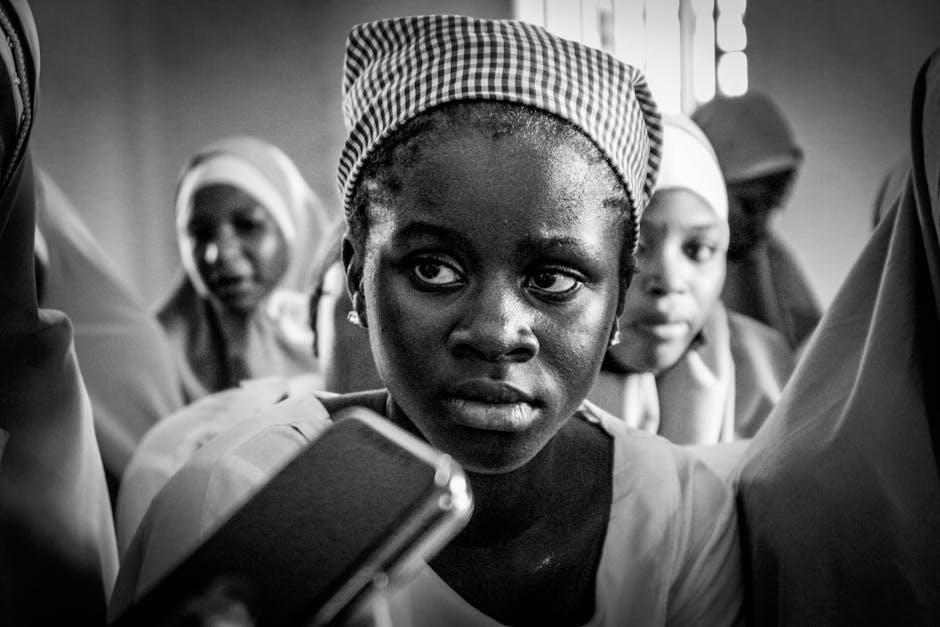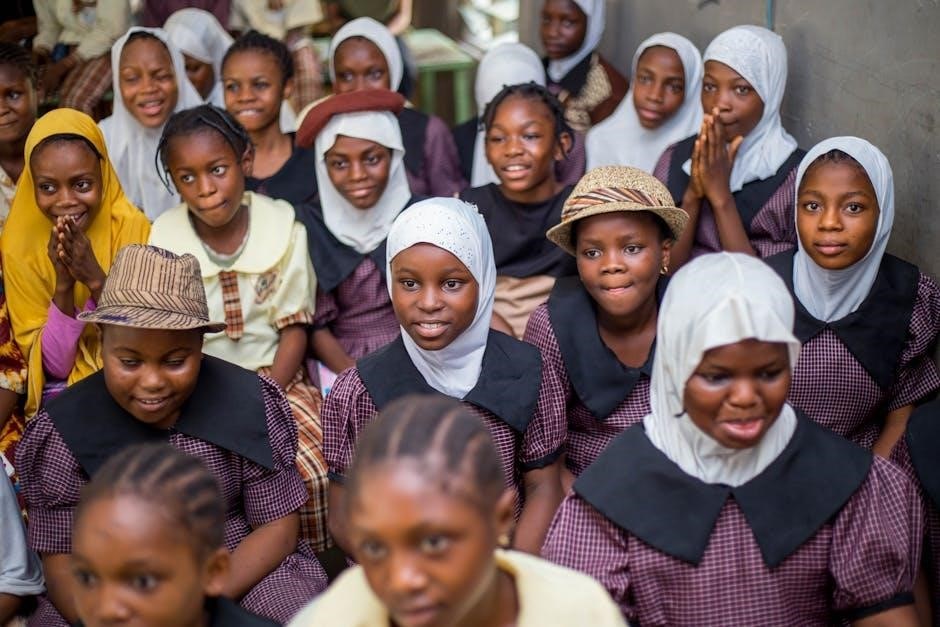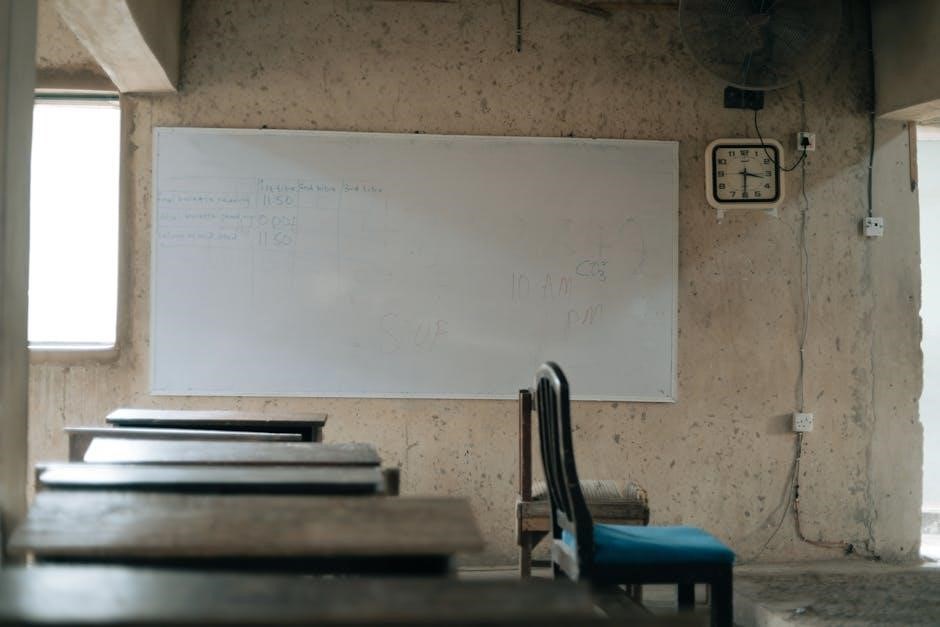Nigeria’s education sector is dynamic‚ with updates on exams‚ admissions‚ and reforms. Staying informed helps students‚ parents‚ and educators navigate challenges and opportunities effectively.
1.1 Overview of the Nigerian Education Sector
Nigeria’s education sector is vast and complex‚ serving millions of students across primary‚ secondary‚ and tertiary levels. It faces challenges like funding shortages‚ infrastructure deficits‚ and security threats. The sector includes public and private institutions‚ with universities‚ polytechnics‚ and colleges of education playing key roles. Reforms and digital integration are ongoing to enhance access and quality.
1.2 Importance of Staying Updated on School News
Staying updated on school news is crucial for students‚ parents‚ and educators. It provides insights into exam schedules‚ admission lists‚ and scholarship opportunities. Timely updates help students make informed decisions about their academic careers. Platforms like Allschool.ng and Myschool.ng offer reliable information‚ ensuring stakeholders are well-prepared for Nigeria’s competitive education landscape and aware of critical issues like ASUU strikes and policy changes.

Latest Educational News in Nigeria
Nigeria’s education sector experiences frequent updates‚ including admission lists‚ exam schedules‚ and scholarship opportunities. Stay informed about the latest developments shaping the country’s educational landscape.
2.1 JAMB News and Updates
The Joint Admissions and Matriculation Board (JAMB) has released updates for the 2025 academic session‚ including registration details and exam preparations. Candidates are advised to utilize the JAMB syllabus and brochure for effective study. Past questions and new exam formats are available to aid preparation. JAMB has also introduced measures to ensure exam integrity and fairness. Stay updated on the JAMB portal for the latest information.
2.2 Post UTME News and Announcements
Post UTME screenings for the 2025 academic session have commenced across Nigerian universities. Institutions like Bayero University Kano and University of Lagos have released schedules for screening exercises. Candidates are advised to check their respective school portals for specific requirements and deadlines. Ensure timely completion of registration processes to secure admission opportunities. Stay informed through official university announcements and updates.
2.3 ASUU Strikes and Their Impact on Education
ASUU strikes continue to disrupt Nigeria’s academic calendar‚ causing prolonged delays in student progress. These strikes‚ often over funding and university autonomy‚ impact learning outcomes and graduate employability. Students and parents face uncertainty‚ while the education system struggles to recover. The persistent strikes highlight systemic issues in Nigeria’s education sector‚ emphasizing the need for sustainable solutions to stabilize academic activities nationwide.
School Admissions in Nigeria
School admissions in Nigeria involve processes like JAMB‚ Post UTME‚ and direct entry. Institutions release admission lists‚ cut-off marks‚ and requirements‚ guiding students through their academic journey.
3.1 Admission Lists for Universities and Polytechnics
Universities and polytechnics in Nigeria regularly release admission lists for undergraduate and postgraduate programs. These lists are often published online‚ allowing candidates to check their admission status. Students can access these lists through institutional portals or platforms like JAMB CAPS. Admission lists vary by institution and program‚ with specific criteria for eligibility. Candidates are advised to verify their admission status promptly and complete necessary registration processes to secure their spots. Stay updated for the latest releases and guidelines to ensure a smooth academic transition.
3.2 Cut-off Marks and Requirements for Admission
Nigerian universities and polytechnics set specific cut-off marks for admission. These vary by institution and program‚ often influenced by JAMB scores‚ Post UTME results‚ and O’Level grades. Meeting the cut-off mark is crucial but not always sufficient for admission. Additional requirements may include departmental screenings‚ interviews‚ or portfolio submissions. Institutions like UNILAG and UI frequently update their criteria‚ so applicants must stay informed to meet all conditions effectively.
Scholarships and Funding Opportunities
Nigeria offers various scholarships‚ such as the TotalEnergies National Merit Scholarship‚ to support students financially. These opportunities aim to promote education and empower students nationwide.
4.1 TotalEnergies National Merit Scholarship
The TotalEnergies National Merit Scholarship offers financial aid to Nigerian undergraduates. Eligible students in accredited institutions can apply annually‚ with awards based on academic excellence and potential to contribute positively to society.
4.2 Federal Government Scholarships for Nigerian Students
Federal Government Scholarships provide financial support to Nigerian students‚ fostering academic excellence. These scholarships are merit-based and cover tuition fees‚ enabling students to pursue higher education without financial barriers‚ while contributing to the nation’s development.
Examination Updates
Nigeria’s examination landscape includes WAEC‚ NECO‚ and JAMB updates. Stay informed about exam dates‚ registration‚ and preparation tips to ensure success in national and school exams.
5.1 WAEC and NECO Exam Updates
WAEC and NECO exams are pivotal for Nigerian students. Regular updates on exam schedules‚ registration deadlines‚ and syllabus changes are essential. Stay informed about exam tips‚ past questions‚ and preparation resources to ensure readiness. These updates help students and educators navigate the examination process smoothly and achieve better results.
5.2 JAMB Registration and Exam Preparations
JAMB registration and exam prep are critical for Nigerian students seeking university admission. Timely updates on registration deadlines‚ exam syllabi‚ and preparation tips are vital. Students can access past questions‚ study guides‚ and online resources to enhance their readiness. Regularly checking JAMB’s official portal ensures candidates stay informed and well-prepared for the exams.
Nigerian Universities and Tertiary Institutions
Nigeria’s tertiary education offers diverse opportunities through accredited universities and polytechnics. Federal‚ state‚ and private institutions provide quality programs‚ fostering academic growth and career development.
6.1 List of Accredited Universities in Nigeria
Nigeria boasts a range of accredited universities‚ both federal and private‚ offering diverse academic programs. Institutions like the University of Lagos‚ Bayero University Kano‚ and Covenant University provide quality education. The National Universities Commission (NUC) ensures compliance with academic standards. Students can explore comprehensive lists on official NUC websites or trusted education portals for verified details.
6.2 Updates on University Fees and Policies
Nigerian universities frequently update fees and policies to align with economic and educational reforms. Institutions like the University of Lagos and Ebonyi State University have introduced changes in hostel fees and security measures. Students are advised to check official university portals for the latest updates to ensure compliance and plan accordingly for academic sessions.

Polytechnics and Colleges of Education
Polytechnics and colleges of education in Nigeria announce latest updates on admission processes‚ program offerings‚ and institutional developments. Stay informed on IJMB‚ ND programs‚ and more.
7.1 Latest News from Nigerian Polytechnics
Nigerian polytechnics are releasing updates on ND and HND programs. Federal Polytechnic‚ Ilaro‚ has announced applications for the 2024/2025 academic session‚ while Auchi Polytechnic has commenced HND screening. Kaduna Polytechnic also reported NBTE accreditation for new courses. Students are advised to check official portals for specific requirements and deadlines to ensure seamless applications and enrollment processes.
7.2 Updates from Colleges of Education
Adeyemi College of Education has released admission lists for the 2024/2025 academic session. Alvan Ikoku College of Education is conducting post-UTME screenings‚ while Nwafor Orizu College of Education introduced new NCE programs. Applicants are advised to check respective college portals for specific deadlines and requirements to ensure timely submissions and avoid missing admission opportunities.
School Gist and Campus Life
Nigerian campuses buzz with vibrant student activities‚ cultural events‚ and competitions‚ fostering a dynamic academic and social environment that enriches student life and personal growth.
8.1 Student Life in Nigerian Schools
Nigerian schools offer a vibrant mix of academic and social activities‚ fostering personal growth. Students engage in cultural events‚ sports‚ and clubs‚ enriching their educational experience. Despite challenges‚ the diverse student body thrives‚ creating lifelong connections and skills essential for future success.
8.2 Notable Events in Nigerian Campuses
Nigerian campuses host diverse events‚ including cultural festivals‚ academic competitions‚ and sporting activities. These events foster unity‚ creativity‚ and leadership among students. For example‚ universities often organize debates‚ art exhibitions‚ and talent shows‚ while student unions lead initiatives like career fairs and community service days‚ enriching campus life and personal development.

Educational Reforms and Policies
Nigeria’s education sector is evolving through policy changes‚ new curricula‚ and digital integration‚ aiming to enhance learning outcomes and accessibility for all students nationwide.
9.1 Recent Changes in the Nigerian Education System
Recent reforms in Nigeria’s education system include the integration of digital learning platforms‚ revised curricula‚ and policies to address out-of-school children. These changes aim to improve access‚ quality‚ and equity in education‚ ensuring students are better prepared for global challenges and opportunities.
9.2 Impact of Reforms on Students and Teachers
The reforms have enhanced students’ access to quality education and modern tools‚ fostering better academic outcomes. Teachers benefit from professional development‚ improving their effectiveness. However‚ challenges like technology adaptation and curriculum changes require support to ensure a smooth transition for both students and educators.

Free Educational Guides for Students
Access free resources‚ including study tips‚ exam preparation guides‚ and admission application processes‚ to support academic success in Nigeria’s education system.
10.1 How to Apply for University Admission
Applying for university admission in Nigeria involves selecting institutions‚ meeting cut-off marks‚ and registering for JAMB and post UTME. Students must upload credentials‚ check admission lists‚ and complete screening processes. For example‚ UNILAG and BUK require online applications and document verification. Utilize resources like myschool.ng for exam prep and admission guides to streamline the process effectively.
10;2 Tips for Passing JAMB and Post UTME
Success in JAMB and Post UTME requires early preparation‚ mastery of syllabi‚ and consistent practice with past questions. Utilize resources like myschool.ng for study guides and exam tips. Focus on time management‚ understanding exam formats‚ and revising weak areas. Stay updated on exam dates and requirements to ensure readiness and confidence.
School News by Region
Explore regional education updates in Nigeria‚ focusing on Northern and Southern developments. Stay informed about local challenges‚ reforms‚ and advancements shaping education across the country.
11.1 Education Updates in Northern Nigeria
Northern Nigeria’s education sector faces unique challenges‚ including security concerns and infrastructure deficits. Recent updates highlight efforts to improve access to quality education‚ with initiatives like school reopenings and partnerships to address out-of-school children. Additionally‚ state governments are implementing programs to enhance learning environments and teacher training‚ aiming to bridge educational gaps in the region.
11.2 Education Updates in Southern Nigeria
Southern Nigeria’s education sector is experiencing positive developments‚ with universities like UNILAG and FUOtuoke implementing improved admission processes and hostel accommodations. Security measures in institutions like Ebonyi State University highlight proactive steps to ensure student safety. These updates reflect efforts to enhance educational access and quality‚ addressing regional challenges and fostering academic growth in the South.
International Opportunities for Nigerian Students
Nigerian students can explore global scholarships and exchange programs‚ such as the TotalEnergies National Merit Scholarship‚ offering opportunities for international education and cultural exchange.
12.1 Studying Abroad: Scholarships and Programs
Nigerian students can access international scholarships like the TotalEnergies National Merit Scholarship and federal government programs. These opportunities provide tuition waivers‚ stipends‚ and cultural exchange experiences. Eligibility criteria vary‚ but often include academic excellence and language proficiency. Students can apply through official portals or partner universities‚ enabling them to pursue degrees in global institutions and broaden their educational horizons.
12.2 Exchange Programs for Nigerian Students
Nigerian students can benefit from exchange programs that offer cultural exposure and academic growth. These programs‚ often organized through partnerships with international universities‚ provide opportunities to study abroad temporarily. Students gain global perspectives‚ enhance their skills‚ and build networks. Eligibility varies‚ but many programs require good academic standing and language proficiency. Such initiatives foster personal and professional development‚ enriching students’ educational journeys.

Challenges in the Nigerian Education Sector
Nigeria’s education sector faces significant challenges‚ including underfunding‚ inadequate infrastructure‚ and security threats‚ which hinder access to quality education for millions of students nationwide.
13.1 Funding and Infrastructure Issues
Nigeria’s education sector struggles with inadequate funding and poor infrastructure. Many schools lack basic facilities like classrooms‚ libraries‚ and laboratories‚ hindering learning. Funding shortages also limit teacher training and resource availability‚ affecting education quality. These issues disproportionately impact rural and disadvantaged areas‚ exacerbating educational inequities and limiting opportunities for millions of students.
13.2 Security Challenges in Schools
Nigerian schools face escalating security threats‚ including kidnappings‚ armed attacks‚ and violence. These incidents disrupt learning‚ cause trauma‚ and deter enrollment. Northeastern regions are particularly vulnerable due to insurgency‚ while banditry affects schools in the northwest. The government has introduced measures like safer school initiatives‚ but challenges persist‚ with many institutions still at risk.
Role of Technology in Nigerian Education
Technology is transforming Nigeria’s education sector‚ enhancing accessibility and improving learning outcomes through e-learning platforms and digital tools‚ despite infrastructure and connectivity challenges.
14.1 E-Learning Platforms in Nigeria
E-learning platforms in Nigeria are revolutionizing education by providing accessible‚ flexible learning options. Platforms like Allschool.ng and Myschool.ng offer JAMB‚ Post UTME past questions‚ and study guides‚ enabling students to prepare effectively for exams and academic success.
14.2 Digital Tools for Students and Teachers
Digital tools like Allschool.ng and Myschool;ng provide students with JAMB‚ Post UTME past questions‚ and study guides‚ enhancing exam preparation. Platforms like Ulearngo offer interactive lessons and progress tracking‚ aiding both students and teachers in organizing and delivering education effectively‚ thus improving learning outcomes and engagement in Nigeria’s education system.

Private vs. Public Education in Nigeria
Nigeria’s education system contrasts private and public schools‚ with private institutions offering better infrastructure and smaller classes‚ while public schools face funding and resource challenges.
15.1 Pros and Cons of Private Schools
Private schools in Nigeria offer advanced resources‚ smaller class sizes‚ and personalized attention‚ enhancing learning experiences. However‚ high fees limit accessibility‚ and some institutions may lack proper regulation‚ raising concerns about quality and equity in education.
15.2 Advantages of Public Education
Public education in Nigeria offers affordability and accessibility‚ making it a viable option for many. It fosters diversity‚ exposing students to varied cultures and backgrounds‚ promoting social integration. Public schools also provide essential facilities and extracurricular activities‚ contributing to holistic development. However‚ challenges like overcrowded classrooms and limited resources can hinder the quality of education provided.
Nigeria’s education system shows progress amidst challenges‚ offering hope for future generations; Staying informed and proactive is key to navigating opportunities and fostering success in education.
16.1 The Future of Education in Nigeria
Nigeria’s education system faces challenges but shows promise through investments in technology and reforms. Efforts to improve funding‚ infrastructure‚ and security are critical. Scholarships‚ e-learning‚ and community involvement are fostering accessibility. With continued focus on innovation and policy changes‚ the future holds potential for a more inclusive and quality education system‚ benefiting students and the nation.
16.2 Encouraging Student Success
Student success in Nigeria is driven by access to resources‚ mentorship‚ and supportive policies. Initiatives like scholarships‚ e-learning platforms‚ and career guidance are empowering learners. Encouraging a culture of innovation and resilience helps students overcome challenges‚ fostering academic and personal growth‚ and preparing them for global opportunities and a competitive future.
